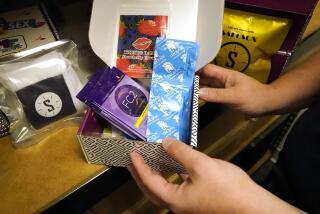Doctors and teenage patients should talk more about sex, study says
- Share via
Both the American Medical Assn. and the American Academy of Pediatrics advise doctors to talk to their teenage patients about sex, but discussions about sexual feelings and health occurred in only 65% of the checkups analyzed in a new study.
Even when physicians and adolescents did talk about sex, those conversations lasted for only 36 seconds, on average, according to a report published online Monday in JAMA Pediatrics.
The data in the study make clear that most teens didn’t feel comfortable speaking with their doctors about sexual issues. Out of 253 adolescent patients included in the analysis, a grand total of zero broached the issue during their checkup. In the 164 visits where sex was discussed, parents broached the subject four times and doctors did so the rest of the time.
In most cases, to call these talks a “discussion” or a “conversation” would be a gross overstatement. In order to get an adolescent patient to say anything beyond a simple “yes” or “no,” doctors had to talk for at least 103.9 seconds and make more than 17 statements, on average. Only 19 of the visits achieved this level of discourse, researchers found.
The findings were based on recordings of doctor visits that were made as part of an ongoing Duke University study called Teen CHAT, which monitors the way healthcare providers discuss weight loss with overweight adolescents. As such, the patients who participated in the JAMA Pediatrics study all had a body mass index that put them in the 85th percentile or higher compared with other kids of their age and gender. All of them were between the ages of 12 and 17, with an average age of 14 years and about 3.6 months.
For the purposes of this study, the research team considered “sexuality talk” to be “any comment, question, or discussion related to sexual activity, sexuality, dating, or sexual identity.” Two researchers listened to each recording of a patient visit, which lasted for 22.4 minutes, on average.
Among their other findings:
* Girls were more than twice as likely as boys to have longer talks about sex. This may be because doctors see girls as more vulnerable to the consequences of sex, especially pregnancy and sexually transmitted infections, the researchers reported. (One doctor was overheard telling his patient that “It is girls who take the hit.”)
* African American teens were nearly 60% more likely than other patients to talk about sex with their doctors. When they did, they were nearly twice as likely to talk for at least 36 seconds.
* The older the patients, the greater the odds that his or her doctor would bring up the subject of sex. For each additional year of age, the odds rose by 49%, the study found.
* Patients were more likely to engage in a discussion about sex when their checkups were longer and when they were able to spend some time alone with their doctor (that is, when parents were asked to leave the room).
* Doctors of Asian descent were 90% less likely than other physicians to talk about sex with their patients.
Overall, the findings seemed to be a disappointment to the researchers. It’s clear that doctors can’t simply wait for their patients to initiate a discussion about sex; they “must be proactive in addressing sexuality issues with adolescents,” they wrote.
The doctors who are already broaching the subject aren’t lingering on the topic long enough to give teens a chance to warm up, the researchers added. If a doctor simply went through a list of questions already laid out by the American Academy of Pediatrics, it would take longer than 35 seconds to read them all – and that’s not counting the time needed for teens to answer, according to the report.
Even if their patients seem too young for sex, it’s important for doctors to talk about it so teens realize “that sexuality is an appropriate and normal discussion topic at health maintenance visits,” the researchers wrote. That message may pay off with “more extensive and detailed discussions during future visits,” they added.
In an editorial that accompanies the study, adolescent health expert Bradley Boekeloo challenged doctors to step up their efforts in the sex education department. Considering that American teenagers are more likely than teens in other developed countries to get pregnant and contract STIs, the need for frank talk is clear, he wrote.
“While parents, family members, teachers, coaches, faith leaders, and peers are important sources of sexual information, primary care physicians have access to objective, science-based sexual information that adolescents need,” wrote Boekeloo, a professor at the University of Maryland School of Public Health.
Interested in the latest medical research studies? Then you like the things I write about. Follow me on Twitter and “like” Los Angeles Times Science & Health on Facebook.
ALSO:
Sexual violence common among teens. Feeling responsible isn’t.
Better-looking teens more likely to graduate college, study finds
1 in 200 mothers reports a “virgin” birth, study finds







